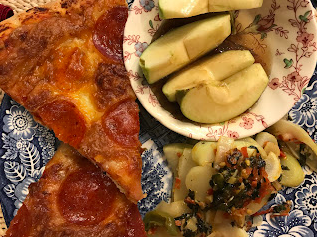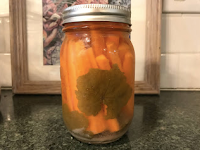We did indeed finish picking blackberries. (Remember that pillow-sized bag of frozen blackberries?) I have since moved on to the plum tree. The plums ripen over a couple of weeks, so I harvest and process over this whole period. This past week I made prunes, plum jam, plum pie, as well as served a lot of fresh plums in compotes, yogurt, and out of hand. I also make chutney every fall, using plums, apples, raisins, and onions. I'm out of onions for the time being. So the chutney-making will have to wait until I can get another grocery order placed. (Gee, I miss those days when I could just run out and pick up 1 thing when I needed it.) Our fruit bowl currently has fresh tomatoes, plums, and a couple of bananas. Once I finish harvesting the plums, I'll move on to digging potatoes. I hope those did well!
This is the perfect time of year to be using our electric dehydrator. Our cool September house benefits from the heated air spewed into the kitchen by the food dehydrator. In addition to drying plums I've also been drying herbs this week. It looks like this will be the last oregano and sage harvest for the year. I cut both plants back as far as I dare go. I now have about 3 cups each of loose-packed dried oregano leaves and sage leaves. Our oregano harvest was not as good as previous years. I'll be working on that part of the herb garden next spring, weeding and mixing in some compost in hopes of getting the output higher again.
This has been about the most frustrating gardening year in terms of dealing with critters. The other day I noticed something had been on the deck and in the raised trough planters. Whatever "it" was, it didn't do a great deal of damage. Then Thursday morning I caught a squirrel in one planter digging up the turnip plants. I replanted those turnips, and I hope they'll take hold again. Then I put a stick fence all the way around the trough. Afterward, I checked the kale trough and found several severed leaves and some half eaten stems. I assume it was the little squirrel doing the damage. I salvaged what I could to use in a couple of meals then built another little fence around that trough. The weather turned chilly earlier than usual and I think this squirrel is looking for food as well as burying spots for his winter stash. I do wonder if the squirrel knows something I don't know about this coming fall and winter.
With the cooler weather I've also been harvesting tomatoes. I've picked all of the orange to red ones and am moving on to the green tomatoes. In my area, tomatoes typically die from blight and not frost. Blight usually develops after a cool rain long before we get a frost. So I pick them as soon as the weather cools like it has this last week. I let some stay on the vine a little longer, so they can grow just a bit more. But I also hedge my bets and pick some now to ripen indoors, even if they're on the small side. In another week or so, I'll use the tiniest green tomatoes in pickle relish for this next year (another reason I need some onions).
I also made the last of the tomato salsa for the year, using up most of the garden cilantro. So, for the year, I made 28 pints of salsa. My family can really plough through it quickly. I'll keep my fingers crossed that this supply lasts a while.
My potted lettuce has been growing so slowly. I don't know if this is the low-light conditions from this time of year or from the cooler nights. Anyway, I moved 2 pots of Romaine into the house and under lights. I hope I can revive them and get more salads for the family.
I came across another World War 2 British series on youtube this week and managed to binge the whole series in a couple of evenings. It's titled Wartime Kitchen and Garden. There are 8 episodes, each about 23 minutes. The series was produced in 1993, predating the series Wartime Farm by nearly 20 years. Wartime Kitchen and Farm is perhaps not as polished as Wartime Farm, but it contains a lot of interesting and sometimes helpful information. Two of the "stars" are people who lived through WW2 and personally understood how challenging the war made cooking and gardening. The real benefit I find from watching these series is a sense of camaraderie with other folks who have needed to be resourceful, make-do, and resist wasting food. Here's the link to episode 1, Wartime Kitchen and Garden. Enjoy!
I placed a Walmart order to be shipped to my house this past week, stocking up on canned tomatoes, tomato paste, instant mashed potatoes, imitation bacon bits (we like them on baked potatoes and in green vegetables), and a giant tub of black licorice for October. Everybody likes a treat now and then. I also picked up an order with more meat, milk, and a couple of pantry items that I can't get shipped.
Cheap & Cheerful Suppers
Meals this last week continued to be humble but tasty. We prepared everything at home, using a lot of garden produce and making as much from scratch as possible, including scratch flour tortillas, scratch biscuits, scratch bread, scratch yogurt, and scratch desserts. My job is all about providing food for my hungry family while staying on a budget.






































